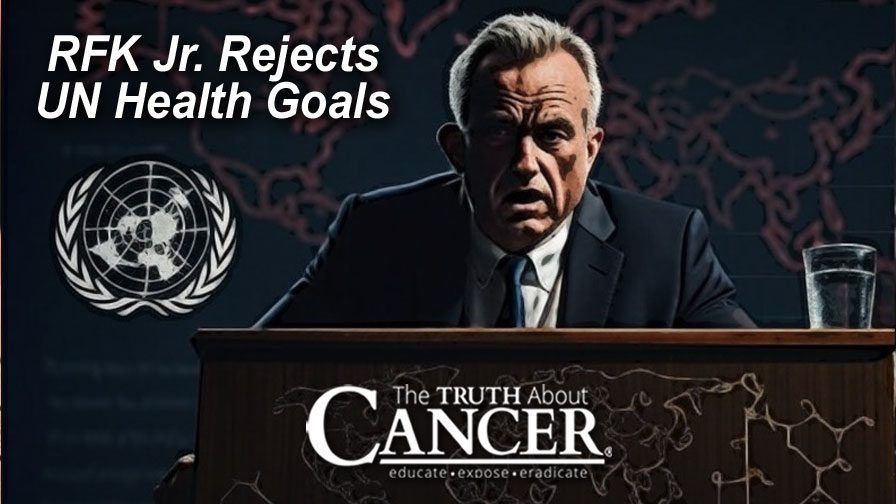Originally published on THE DEFENDER
The U.S. last week rejected the United Nations’ (U.N.) political declaration on noncommunicable diseases — a proposal that doesn’t go far enough in targeting the “scourge” of chronic disease, U.S. Health Secretary Robert F. Kennedy Jr. told the U.N. General Assembly on Thursday.
The non-binding declaration sets “specific but modest targets for reducing chronic diseases by 2030,” The Hill reported.
The targets include reducing tobacco use and the number of people with hypertension by 150 million globally by 2030, increasing the number of people with access to mental healthcare by the same number, and responding to the global rise in noncommunicable conditions such as cancer, diabetes and heart disease.
Kennedy called the goals insufficient because they ignore the contribution of ultraprocessed foods to the global rise in chronic disease.
“Chronic disease has more than doubled in a single generation,” Kennedy said. “Millions of children now lose healthy years before they reach adulthood,” Kennedy said.“This crisis does not stop at America’s borders.”
The United States will walk away from the Declaration on Non-Communicable Diseases, but we will never walk away from the world—or our commitment to end chronic disease. pic.twitter.com/bxQbfzMbrb
— Secretary Kennedy (@SecKennedy) September 26, 2025
Kennedy said U.S. President Donald Trump “wants to lead the effort globally against ultra-processed foods and the medical and physical illness associated with it.”
“We’re calling on the international community to come together to combat this scourge. We stand ready to lead, to partner, to innovate with every nation committed to a healthier future,” Kennedy said.
Sayer Ji, chairman of the Global Wellness Forum and founder of GreenMedInfo, applauded Kennedy’s decision to reject the declaration, which he called a “watershed moment in the defense of sovereignty and truth.” He added:
“This was the right move — indeed, the only move that could honor both the Constitution and the health of the people. The declaration is a Trojan horse. It never names the real culprits behind the global chronic disease crisis — ultra-processed food cartels, toxic chemical industries and predatory corporate practices.
“Kennedy didn’t just reject a declaration. He drew a boundary the world desperately needs: the U.N. can advise, but it cannot dictate. It can coordinate, but it cannot coerce. That distinction is the thin line between democracy and technocracy. The fact that an American official finally had the courage to say it — clearly, unequivocally, on the world stage — marks the beginning of a new chapter.”
Targeting ultraprocessed foods is one of the key components of Kennedy’s Make America Healthy Again (MAHA) agenda, which aims to reverse the chronic disease epidemic.
Declaration would lead to ‘oppressive management’ by international bodies
Kennedy said that instead of focusing on the risks ultraprocessed foods pose to human health, the U.N. declaration contained “provisions about everything from taxes to oppressive management,” The Hill reported.
According to Kennedy, these provisions, if enacted, would limit national sovereignty, resulting in “oppressive management by international bodies” for global public health matters.
Kennedy questioned the role of the U.N. and the World Health Organization (WHO) — a U.N. agency — in global health leadership. “The draft declaration should not have been included in today’s agenda.”
He added:
“The U.N.’s approach is misdirected. It attempts both too little and too much. It exceeds the U.N.’s proper role while ignoring the most pressing health issues.And that’s why the United States will reject it. The WHO cannot claim credibility or leadership until it undergoes radical reform.”
The U.S. previously criticized the proposed declaration. In a Sept. 18 memo, the U.S. Mission to the U.N. said the draft declaration “has not been agreed by consensus in advance” and therefore “should not be brought before the high-level meeting for approval.”
Dutch attorney Meike Terhorst, who is active on issues of health and medical sovereignty, said, “Health should be addressed at the national level, not at the level of the U.N. or WHO,” Terhorst said. “I oppose independent treaty bodies such as the U.N. and WHO acquiring more rights, without any checks and balances being in place.”
Shabnam Palesa Mohamed, executive director of Children’s Health Defense Africa and founder of Transformative Health Justice, highlighted the necessity of challenging the U.N.’s efforts to broaden its authority.
“Questioning the U.N.’s extension of focus beyond its official mandate is important,” she said. “Mission creep, without public knowledge and consent, is a threat to health, national sovereignty and international cooperation.”
According to National Public Radio (NPR), Kennedy wasn’t alone in questioning the declaration’s proposals.
“Some countries and advocates have expressed concerns about the text, such as the fact that the document does not discuss sugary beverages despite the role they play in rising rates of childhood obesity,” NPR reported.
“Kennedy’s stance has cracked open the door for others,” Ji said. “Many nations — especially in the Global South — know firsthand how these institutions have failed them. They may not say it aloud yet, but they will take heart from America drawing a red line.”
Declaration would usher in ‘infrastructure for comprehensive biosurveillance’
Writing on Substack, Ji said the declaration contained several “mechanisms designed to transfer authority from nations to global institutions.”
One would require the development of what Ji described as a “digital surveillance infrastructure.” He said paragraphs 61 and 73-74 of the declaration propose “integrated surveillance” with “interoperability across digital health platforms.”
This proposal would create “infrastructure for comprehensive biosurveillance,” Ji wrote.
The declaration also demands that countries “introduce or increase taxes,” including on products such as tobacco and alcohol, which Ji described as a surrender of national fiscal sovereignty.
The declaration’s call for a “whole-of-society” approach would further undermine national sovereignty, by creating “parallel governance” structures in which nongovernmental organizations, corporations and other international organizations “shape national policy without democratic mandate, bypassing citizen accountability,” Ji wrote.
Kennedy had no choice but to reject the declaration, according to Ji. He wrote:
“The implications extend far beyond health policy. Kennedy’s stand signals that America will no longer subordinate its Constitution, its democratic processes, or its citizens’ rights to unelected international bodies — regardless of the humanitarian language used to justify such subordination.”
The declaration “smuggles in sweeping surveillance mandates, fiscal controls and behavioral engineering schemes that concentrate power in unelected hands while pretending to ‘save lives,’” Ji told The Defender.
U.S. rejection of declaration forces vote in General Assembly
The U.S.’ rejection of the proposed declaration means that, instead of being passed by consensus — without a vote — the proposal will have to be voted on in the U.N. General Assembly.
According to Health Policy Watch, this vote will “most likely” be held next month. The Guardian reported that the declaration is expected to be agreed upon “in the coming weeks,” despite the U.S. rejection.
In remarks cited by NPR, U.N. General Assembly President Annalena Baerbock, who served as Germany’s foreign minister as a member of the Green Party between 2021 and 2025, said “the rest of the governments will move forward and act and take their commitment forward.”
“There’s a feeling of resolve not to let this stand in the way of the urgent action needed,” Baerbock said.
Health Policy Watch reported that the declaration, which was “painstakingly negotiated,” has the support of the majority of U.N. member states, including key coalitions such as the Group of 77, which includes China, consists of 130 emerging economies.
Jeremy Farrar, Ph.D., the WHO’s assistant director general, said the declaration still has momentum among U.N. member states. He told Health Policy Watch:
“Although we need to say nobody’s happy with it, everybody is moving forward. And ultimately, does anybody in Ho Chi Minh City or Jakarta or London really care what’s in that declaration? What matters is what the governments now go back to do in their own jurisdiction, and that’s what really matters.”
Farrar previously played a role in the development of key COVID-19 pandemic-era policies, including mass vaccination.
Public recognizes ‘dangers of ceding sovereignty to captured institutions’
U.N. member states now face a “binary choice” between accepting the declaration and surrendering their national sovereignty or joining the U.S. in rejecting the declaration, Ji wrote.
By rejecting the declaration, countries would “Maintain national sovereignty, address root causes (ultra-processed food), reject corporate capture, demand WHO reform, [and] prioritize health over bureaucracy,” Ji wrote.
The decision to reject the declaration comes just months after other decisions by the Trump administration questioning the role of the U.N. and WHO in global health governance.
In January, Trump ordered the U.S. to withdraw from the WHO, citing the organization’s “mishandling of the COVID-19 pandemic.” The withdrawal process will be completed next year.
In July, the U.S. rejected amendments to the WHO’s International Health Regulations (IHR). Kennedy said at the time that the amendments would grant unprecedented authority to “an unelected international organization that could order lockdowns, travel restrictions or any other measures that it sees fit.”
As for the U.N. proposal, Ji said, “This document mirrors the same sovereignty-eroding pattern we saw with the WHO’s IHR amendments and pandemic treaty: bureaucrats and their corporate partners manufacturing consensus, then imposing compliance frameworks on nations without democratic mandate.”
In June, the U.S. government withdrew its funding for Gavi, The Vaccine Alliance, the leading global organization promoting vaccination. The Bill & Melinda Gates Foundation co-founded Gavi in 2000 and is one of its permanent board members and its largest donor. Gavi is the third-largest donor to the WHO.
UNICEF, the World Bank and the WHO — whose second-largest donor is the Gates Foundation — hold the other permanent seats. The Clinton Health Access Initiative also sits on the board.
Mohamed said:
“This ecosystem of declarations, amendments and agreements serves as a sophisticated distraction. It creates the illusion of progress while allowing corporate entities that dominated the last pandemic, such as Gates-led and funded projects, to preserve the architecture that will allow them to dominate other alleged emergencies.”
The decisions to reject U.N.-led global public health efforts enjoy broad public support in the U.S., according to Ji. He said:
“On Stand For Health Freedom’s digital advocacy platform alone, half a million American advocates have already taken action in the past year to demand the U.S. exit the WHO for precisely these reasons — the people have recognized the dangers of ceding sovereignty to captured institutions.”



















Jeffrey Dach, an orthomolecular doctor in Hollywood, FL sent me a similar article of what transpired today. Another issue is that too many reps in Congress like Senator Maria Cantwell take money from HARM and don’t learn the truth about the shots!
Absolutely amazing article. Thank you for saying it like it is and nailing it on the head.
We have to stop these WHO and Un fronts for big corporations, and people like Bill Gates who are lusting for more money, and more power. They have an agenda and it is NOT to help the people of this world. We must stand up for our own sovereignty, and the sovereignty of our nations, and not grant these organizations any more power, but in fact strip the power from them, and as Kennedy has said to do a complete overhaul of these organizations and put them back in their place which is not to rule the world.